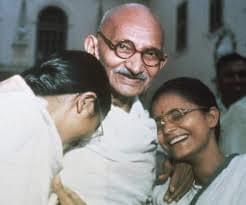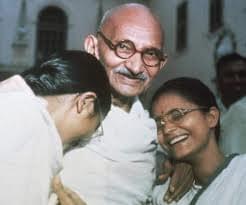Commentary
Passion and Politics of Mahatma
Gaurav
Oct 02, 2011, 07:33 PM | Updated May 02, 2016, 04:11 PM IST
Save & read from anywhere!
Bookmark stories for easy access on any device or the Swarajya app.


Passion of Mahatma
It was on 30th of January sixty years ago that Mahatma Gandhi fell to the bullets of Nathuram Godse, thus ending an important era in Indian history. An era which witnessed Mahatma emerging as focal point of not just politics, but also of social and cultural churning. Yet, even as this era ended with his funeral pyre, his legacy or rather debate to define his legacy would continue to be a major influence in decades to follow, with more often than not a source of utter confusion to anyone who tries to decipher it.
I think his legacy is best understood in context of freedom movement, which can be divided into before and after Gandhi period. This later period can be best understood in terms of a journey, one which was deeply personal for Mahatma, a journey of self-realization.
The freedom movement led by Mahatma was for all purposes a mass movement, in that it was different from previous movements which had their mooring in a rising middle class. This movement was a result of popular passion, whereas the previous ones had intellectual underpinning. Yet it was different from other mass movements of that era, notably communism or socialism which were propelled by an dogma centered around class struggle, or fascism with state as ideal expression of the entity the people, for the public imagination in this movement was driven by spirituality of one man*. That man was Mahatma.
Mahatma Gandhi was, by disposition not an intellectual, or a philosopher. Instead, he was, due to upbringing in a religious environment, basically a believer, a man motivated by his faith. The extension to this was his belief in essential goodness of humanity. It was his religious temperament which necessitated to him that methods adopted for the freedom movement agree strictly with his deeply held personal conviction. This explains his absolute insistence on Ahimsa, or rejection of industrial production in favour of cottage industries. Even when he extrapolated this to the extent where he seemed to discourage trade for self sufficiency of village, his motivation was to establish a pastoral Elysium in India**. Similarly his approach to caste discrimination is explained, he deeply cared about discrimination, but he was even more concerned about Shantih, more properly understood as harmony than peace.
It was this personal conviction and faith which found a resonance with the masses, the quest for freedom under Mahatma's lead transformed from a political movement to a spiritual movement resulting in a groundswell never witnessed previously, and which ensured Mahatma's fame for all time to come.
But this approach had its shortcoming and grievous one at that. While Mahatma was successful in securing loyalty of populace, in his quest for personal spiritual purity, he lost the sight of the fact that demands and conditions that faith of individual entails are not necessarily agreeable with the course that must be charted for fulfilling destiny of a nation. And it was inability, or rather refusal to accept this inevitable incompatibility which led to Mahatma to faulty premises.
Where does this leave us ? Reaction to Mahatma is either ardent worship or equally ardent hatred. Both the reactions are misplaced. In my opinion more important is an understanding of the factors drove Mahatma, and were ultimately responsible for his failures.
Politics of Mahatma
Mahatma was a clever politician. To be sure, I have heard this comment many times earlies, but never agreed with it, for one, Congress before independence was more of a platform for freedom movement and less of a political party, but even where there was political side to Congress there is hardly any evidence that Mahatma was involved in political process and maneuvering. He was not concerned with organizations or elections as well. His involvement in Congress was mostly restricted to mass mobilization. i.e. as a movement leader.
Now its true he did intervene in rare cases, but that was hardly for political reasons and more due to ideological ones. In fact his action of nuking Subhash Chandra Bose betrays absence of political sensibility.
Now there is another charge less often heard which has some merit, that Mahatma was a demagogue, nevertheless it is also incorrect. While it its true that the movement led by Mahatma was a mass movement, one which supplanted the earlier middle class he never pandered to the masses. If the masses followed him it was because they were attracted to his ideals, not the other way. In fact as the example of Chauri Chaura shows he stood up to the masses when he felt that they were on wrong path.
Mahatma was a fanatic but not necessarily of any ideological bent, but consumed by desire for spiritual cleansing, a desire which turned his outlook increasingly self focussed, to the exclusion of any other perspective. A common failing for a Hindu.
(These posts were originally written our resident commentator Doubting Gaurav at his blog http://lifeandsomething.blogspot.com/)
President, Captain Mal Reynolds Appreciation Society, CRI Chapter




